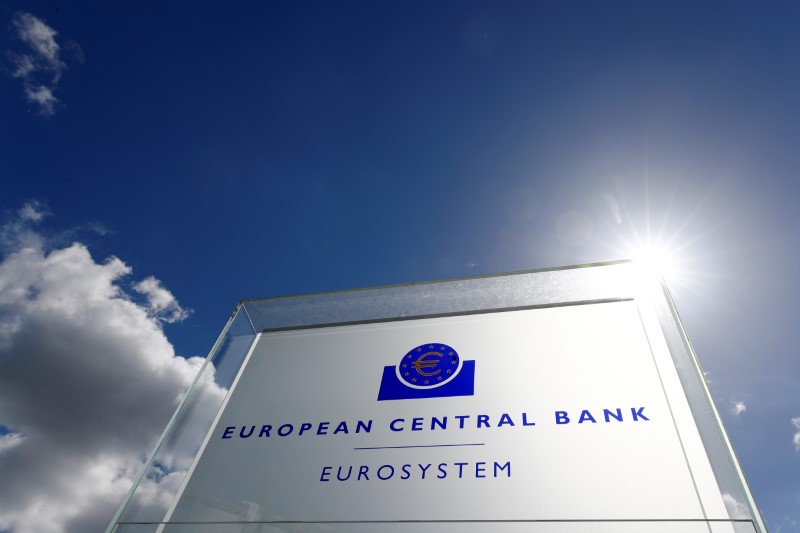 © Reuters. FILE PHOTO: The logo of the European Central Bank (ECB) is pictured outside its headquarters in Frankfurt
© Reuters. FILE PHOTO: The logo of the European Central Bank (ECB) is pictured outside its headquarters in FrankfurtFRANKFURT (Reuters) – European Central Bank policymakers are split over when the ECB might raise interest rates next year, with some saying an increase is possible as early as July 2019 and others ruling out a move until autumn, according to several sources.
The ECB said last month it expected to keep rates at their current, record-low levels “through the summer” of 2019, wording vague enough to leave the exact meaning open to debate.
Investors took the phrase to mean rates would not go up until October or even December of next year. But policymakers speaking to Reuters on condition of anonymity gave different interpretations.
For some, the guidance explicitly ruled out any move until the summer is over, meaning after Sept. 21 at the earliest.
“That’s the only possible interpretation,” one of the sources said.
That would suggest the Oct. 24 meeting would be the earliest opportunity for a move, some rate-setters argued.
But others saw the wording as vague enough to allow for a rate hike at the July 25 meeting if the outlook for inflation called for it.
“You cannot tie yourself for more than a year,” another source said.
The message could be clarified closer to the time in light of economic developments, the source said.
All sources added that policymakers did not debate the meaning of this guidance, a possible reason for the differing interpretations.
Some expressed annoyance with an overly dovish message by ECB President Mario Draghi that pushed rate hike expectations to December, a date hawks consider too late.
A recent rise in oil prices is increasing the risk that inflation could accelerate more than expected, but Draghi warned about the risks to economic growth from increasing trade protectionism around the globe.
The ECB declined to comment.
French central bank Governor Francois Villeroy de Galhau said on Wednesday the ECB could raise rates “at the earliest through the summer of 2019”, wording slightly different than the ECB’s guidance for unchanged rates through the summer.
Since the June policy meeting, the ECB has even corrected the translations of its statement in several languages, including French and German, to remove a reference to the end of the summer.
Some of the more hawkish members of the policy-making Governing Council saw that as a victory of sort, fearing that the ECB may come to regret pushing out investor expectations too far.
Pressed about the meaning of “through the summer” at his latest press conference, Draghi also declined to pin that to a specific month.
“If it had meant September, we would’ve said September,” Draghi said in Riga on June 14.
The ECB now expects inflation to average 1.7 percent this year and the following two, which some see as compatible with its deliberately vague target of close to but below 2 percent.
Fusion Media or anyone involved with Fusion Media will not accept any liability for loss or damage as a result of reliance on the information including data, quotes, charts and buy/sell signals contained within this website. Please be fully informed regarding the risks and costs associated with trading the financial markets, it is one of the riskiest investment forms possible.
Source: Investing.com




























